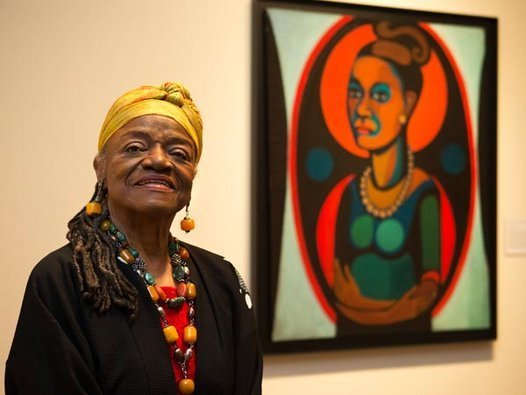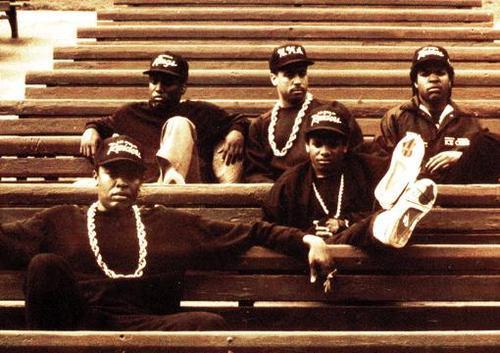Mark Anthony Neal's Blog, page 873
August 20, 2013
Faith Ringgold Talks Her Career & the March on Washington with 'Tell Me More'
Published on August 20, 2013 07:26
'Chi Raq'—a film by Will Robson-Scott
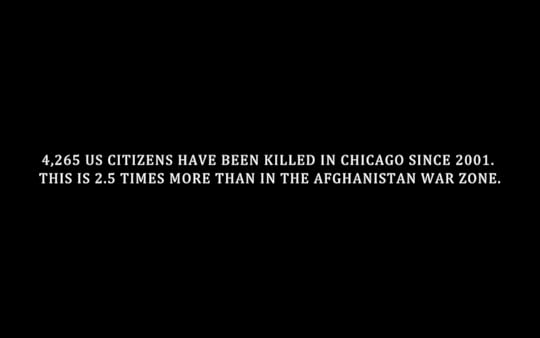 ProteinTV
ProteinTVProtein is very proud to present Chi Raq, a film by London-born photographer/filmmaker Will Robson- Scott. The first in a series of exclusive commissions for Protein TV, Chi Raq is an intimate video portrait of life in South and West Chicago.
For the past decade, Chicago has been enduring a violence epidemic, with a death toll in the thousands and casualties mirroring the losses experienced by the US army in Iraq war over the same period. Allowing its subjects to take centre stage and tell their stories in their own words, Robson-Scottʼs film is unflinchingly honest in its depiction of life on the streets of one of the most dangerous cities in America.Film by Will Robson-ScottEdited by Luca CampanaleMusic by Lee RosevereProducer: Bridie WoodwardExecutive Producer: William Rowe
Presented by ProteinSupport from Plus
Published on August 20, 2013 06:52
August 18, 2013
'Say Yes'—a Film Short from Ava DuVernay
 AFFRM:
AFFRM:SAY YES explores the power of the affirmative, and the beauty that blossoms from embracing life. Inspired by the Fashion Fair lip color, Say Yes, Sundance award-winning filmmaker, Ava DuVernay created this vision of what happens when you welcome the unexpected.Starring Kali Hawk and Lance Gross.
Published on August 18, 2013 11:22
#BlackPowerisforBlackMen: A Booklist
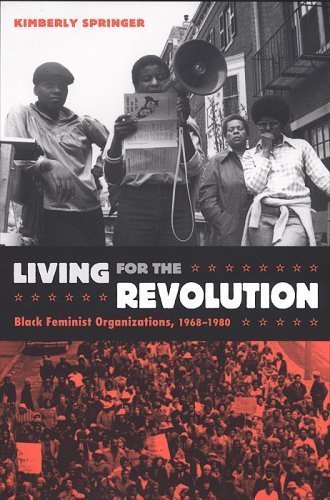
Black Feminist Thought—by Patricia Hill Collins
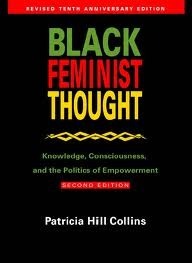
Routledge: In spite of the double burden of racial and gender discrimination, African-American women have developed a rich intellectual tradition that is not widely known. In Black Feminist Thought, originally published in 1990, Patricia Hill Collins set out to explore the words and ideas of Black feminist intellectuals and writers, both within the academy and without. Here Collins provides an interpretive framework for the work of such prominent Black feminist thinkers as Angela Davis, bell hooks, Alice Walker, and Audre Lorde. Drawing from fiction, poetry, music and oral history, the result is a superbly crafted and revolutionary book that provided the first synthetic overview of Black feminist thought and its canon.
Talking Back: Thinking Feminist, Thinking Black—by bell hooks
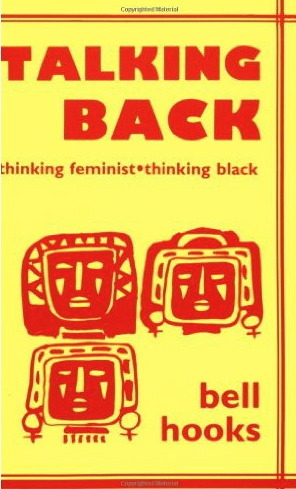
South End Press: In Talking Back, hooks investigates feminist theory in an accessible style and grounds her discussion in personal testimony. Chapters address a broad range of issues such as feminist scholarship, homophobia in black communities, self-recovery, violence in intimate relationships, overcoming white and male supremacy, and exploring the point where the public and the private meet.
Traps: African-American Men on Gender & Sexuality—ed. by Beverly Guy-Sheftall & Rudolph Byrd
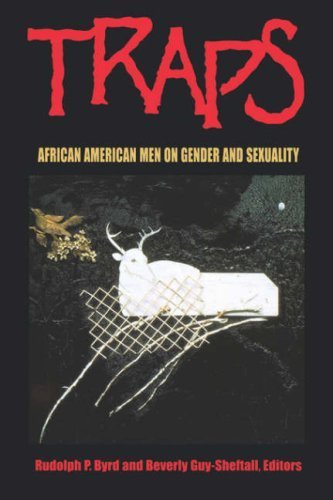
Indiana University Press: Traps is the first anthology of writings by 19th- and 20th-century African American men on the overlapping categories of race, gender, and sexuality. The selections on gender in Sections I and II reveal what some may view as the unexpected commitment of African American men to feminism. Included here are critiques of the subordinate social, economic, and political position of black women. Sections III and IV analyze the taboos and myths in which black sexuality is enmeshed. These essays also stress the importance of rejecting homophobia and the need to contest the predominance of a heterosexual paradigm. Monolithic constructions of gender and sexuality, reinforced by sexism and historically sanctioned homophobia, are the “traps” that give this book its focus and its title.
Black Male Outsider: Teaching As a Pro-Feminist Man,A Memoir –by Gary L. Lemons
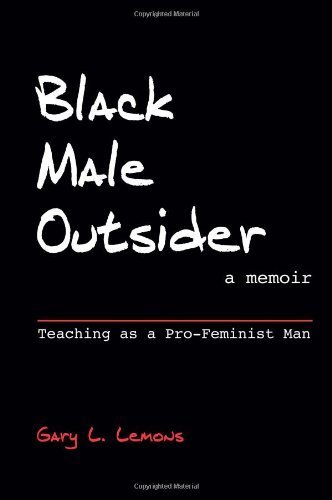
SUNY Press: This fascinating book traces the development of the author’s consciousness as a black male pro-feminist professor. Gary L. Lemons explores the meaning of black male feminism by examining his experiences at the New York City college where he taught for more than a decade—a small, private, liberal arts college where the majority of the students were white and female. Through a series of classroom case studies, he presents the transformative power of memoir writing as a strategic tool for enabling students to understand the critical relationship between the personal and the political. From the insightful inclusion of his own personal narratives about his childhood experience of domestic violence, to stories about being a student and teacher in majority white classrooms for most of his life, Lemons takes the reader on a provocative journey about what it means to be black, male, and pro-feminist.
Ain’t I A Feminist: African-American Men Speak Out onFatherhood, Friendship, Forgiveness and Freedom—by Aaronette M. White
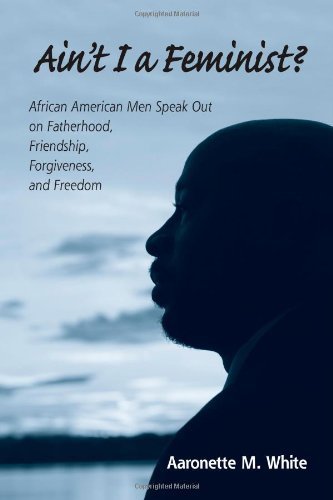
SUNY Press: Ain’t I a Feminist? presents the life stories of twenty African American men who identify themselves as feminists, centering on the turning points in their lives that shaped and strengthened their commitment to feminism, as well as the ways they practice feminism with women, children, and other men. In her analysis, Aaronette M. White highlights feminist fathering practices; how men establish egalitarian relationships with women; the variety of Black masculinities; and the interplay of race, gender, class, and sexuality politics in American society. Coming from a wide range of family backgrounds, ages, geographical locations, sexualities, and occupations, each man also shares what he experiences as the personal benefits of feminism, and how feminism contributes to his efforts towards social change. Focusing on the creative agency of Black men to redefine the assumptions and practices of manhood, the author also offers recommendations regarding the socialization of African American boys and the reeducation of African American men in the interest of strengthening their communities.
Progressive Black Masculinities—ed. by Athena Mutua
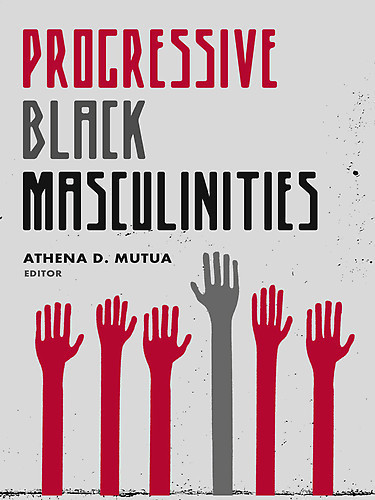
Routledge: In the struggle for pride and political agency, the imperative to 'be a man' has been central to the lives of black males. Yet, what it means to be a black man-in terms of both racial and gender identity-has been subject to continual debate in public and academic spheres alike. Progressive Black Masculinities brings together leading black cultural critics including Michael Eric Dyson, Mark Anthony Neal, and Patricia Hill Collins to examine an alternatively demonized and mythologized black masculinity. Collectively, they offer a roadmap for new, progressive models of black masculinity that may chart the course for the future of black men.
Breaking the Silence: Towards a Black Male FeministCriticism—by David Ikard
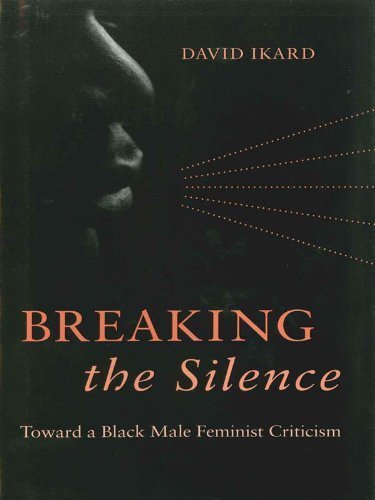
LSU Press: Can black males offer useful insights on black women and patriarchy? Many black feminists are doubtful. Their skepticism derives in part from a history of explosive encounters with black men who blamed feminism for stigmatizing black men and undermining racial solidarity and in part from a perception that black male feminists are opportunists capitalizing on the current popularity of black women's writing and criticism. In Breaking the Silence, David Ikard goes boldly to the crux of this debate through a series of provocative readings of key African American texts that demonstrate the possibility and value of a viable black male feminist perspective.
But SomeOf Us Are Brave: All the Women Are White, All the Blacks Are Men: Black Women'sStudies—ed. Gloria T. Hull, Patricia Bell Scott, Barbara Smith
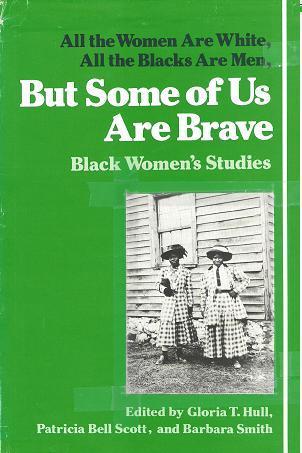
The Feminist Press: Winner of the Outstanding Women of Colour Award, and the Women Educator's Curriculum Material Award, this ground-breaking collection provides a wealth of materials needed to develop course units on black women, from political theory to literary essays on major writers to work on black women's contributions to the blues. Bibliographies and a collection of syllabi provide readers with essential classroom materials and a map for further research. For course use in: African American studies, feminist thought, lesbian studies, racism and sexism, women's studies.
When Chickenheads Come Home to Roost: My Life as a Hip-HopFeminist -- by Joan Morgan
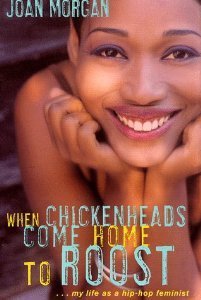
Simon & Schuster: In this fresh, funky, and ferociously honest book, award-winning journalist Joan Morgan bravely probes the complex issues facing African-American women in today's world: a world where feminists often have not-so-clandestine affairs with the most sexist of men; where women who treasure their independence often prefer men who pick up the tab; and where the deluge of babymothers and babyfathers reminds black women who long for marriage that traditional nuclear families are a reality for less than 40 percent of the African-American population.
Sister Outsider: Essays and Speeches—Audre Lorde
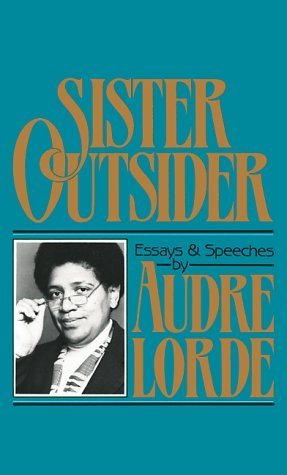
Crossing Press | Random House: Presenting the essential writings of black lesbian poet and feminist writer Audre Lorde, SISTER OUTSIDER celebrates an influential voice in twentieth-century literature. In this charged collection of fifteen essays and speeches, Lorde takes on sexism, racism, ageism, homophobia, and class, and propounds social difference as a vehicle for action and change. Her prose is incisive, unflinching, and lyrical, reflecting struggle but ultimately offering messages of hope. This commemorative edition includes a new foreword by Lorde scholar and poet Cheryl Clarke, who celebrates the ways in which Lorde's philosophies resonate more than twenty years after they were first published. These landmark writings are, in Lorde's own words, a call to “never close our eyes to the terror, to the chaos which is Black which is creative which is female which is dark which is rejected which is messy which is. . . .”
Ella Baker and the Black Freedom Movement: A RadicalDemocratic Vision – Barbara Ransby
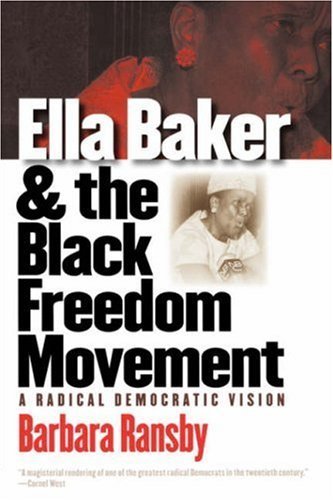
UNC Press: One of the most important African American leaders of the twentieth century and perhaps the most influential woman in the civil rights movement, Ella Baker (1903-1986) was an activist whose remarkable career spanned fifty years and touched thousands of lives. In this deeply researched biography, Barbara Ransby chronicles Baker's long and rich political career as an organizer, an intellectual, and a teacher, from her early experiences in depression-era Harlem to the civil rights movement of the 1950s and 1960s. Ransby shows Baker to be a complex figure whose radical, democratic worldview, commitment to empowering the black poor, and emphasis on group-centered, grassroots leadership set her apart from most of her political contemporaries. Beyond documenting an extraordinary life, the book paints a vivid picture of the African American fight for justice and its intersections with other progressive struggles worldwide across the twentieth century.
BluesLegacies and Black Feminism: Gertrude "Ma" Rainey, Bessie Smith, andBillie Holiday by Angela Y.Davis
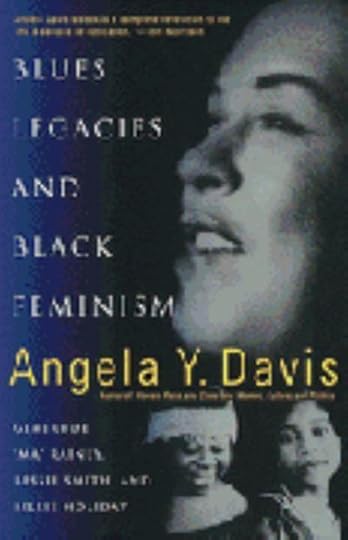
Pantheon Books: The author of "Women, Race and Class" suggests that "Ma" Rainey, Bessie Smith, and Billie Holiday represent a black working-class, feminist ideology and historical consciousness. Davis' illuminating analysis of the songs performed by these artists provides readers with a compelling and transformative understanding of their musical and social contributions and of their relation to both the African-American community and American culture
Published on August 18, 2013 09:06
August 17, 2013
GlobalGirl Media & Peace Over Violence Talk Dating Violence
 GlobalGirlMedia
GlobalGirlMediaPeace Over Violence meets GlobalGirl Media to discuss what makes a violent relationship in teen dating, what are the signs, how to avoid, is it usually the man or the woman?
Published on August 17, 2013 19:57
Remembering Black Political Strategist Bill Lynch
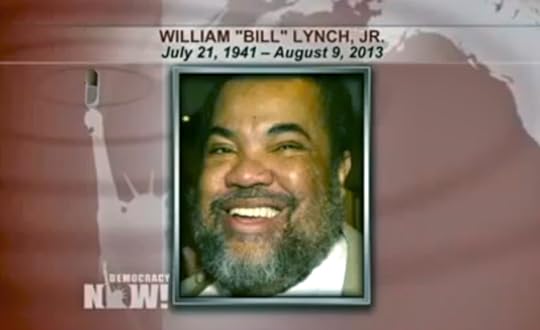 Democracy Now
Democracy NowA funeral was held Thursday for the influential New York-based political strategist Bill Lynch who died last week at the age of 72. In the 1988 Democratic presidential primary he masterminded Rev. Jesse Jackson's upset win among New York City Democrats. He played a pivotal role in the election of David Dinkins as New York's first African-American mayor. In 2009 he helped John Liu be elected as New York City comptroller making Liu the first Asian-American elected to citywide office.
Published on August 17, 2013 19:43
MHP Show: How Would N.W.A. Rap about 'Stop-and-Frisk'
Published on August 17, 2013 19:19
On Test Scores and Poverty by Mark Naison
 On Test Scores and Poverty
by Mark Naison | special to NewBlackMan (in Exile)
On Test Scores and Poverty
by Mark Naison | special to NewBlackMan (in Exile)To understand how unique our current historical moment is, and in particular, how much powerful corporate interests have seized control of both political parties, ask yourself the following questions:.
When FDR spoke of a third of a nation “ill-housed, ill clothed, and ill-fed” did he identify raising student test scores as a major component of his program to heal a wounded nation?
When LBJ launched the anti-poverty program, did low test scores of young people living in poverty represent a major target of the programs he initiated?.
When Dr King unveiled his idea for the “Poor People’s Campaign,” was poor performance on tests among the nation’s poor a central subject of his rhetoric?
The very posing of these questions moves us into the realm of absurdity—yet in state after state, and in the US Department of Education, “closing the achievement gap”—i.e. raising the test scores of students in poor communities—is lauded as the civil rights cause of our time, and the one sure fire method to reduce inequality in a society where every other policy seems to maximize it.
Do current policy makers know something that FDR, LBJ and Dr. King didn’t, or is the egalitarian rhetoric underlying their obsession with raising student test scores disingenuous and self-deluded?
While I cannot pretend to know what policy makers, in their heart of hearts, really think, I do know this—that since No Child Left Behind was passed in 2001, child poverty has skyrocketed, the concentration of wealth at the top of the society has grown, the prison industrial complex has expanded, and the gap in college admission and retention between poor and wealthy students has expanded.
And as for schools, we see the wealthy sending their children to private schools with few tests and a huge emphasis on the arts- and the poor and the rapidly shrinking middle class sending their children to schools which are stripped down test factories with beaten down and demoralized teachers.
This is the ugly reality that the flowery rhetoric of inclusion hides If narrowing the achievement gap is an anti-poverty strategy, it is the single most ineffective such strategy in modern America History.
***
Mark Naison is a Professor of African-American Studies and History at Fordham University and Director of Fordham’s Urban Studies Program. He is the author of two books, Communists in Harlem During the Depression and White Boy: A Memoir. Naison is also co-director of the Bronx African American History Project (BAAHP). Research from the BAAHP will be published in a forthcoming collection of oral histories Before the Fires: An Oral History of African American Life From the 1930’s to the 1960’s.
Published on August 17, 2013 07:48
August 16, 2013
Trailer: The Stuart Hall Project—A Film by John Akomfrah
 SmokingDogsFilms
SmokingDogsFilmsStuart Hall is one of the most influential and esteemed cultural theorists of his generation. A thinker and commentator, his is one of the intellectual giants of the last sixty years.
John Akomfrah's sweeping and majestic feature length documentary THE STUART HALL PROJECT takes the viewer on a roller coaster ride through the upheavals, struggles and turning points that made the 20th century the most important period of global political change to date. THE STUART HALL PROJECT is a documentary told through the ideas of Stuart Hall and heard through the sonic landscape of the music of Miles Davis.
Published on August 16, 2013 20:39
Love Me Tender: The Complex Legacy of Elvis Presley by Mark Anthony Neal
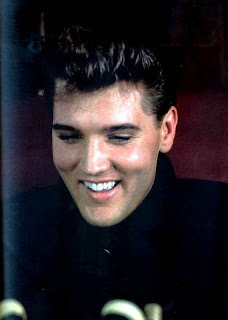 Love Me Tender: The Complex Legacy of Elvis Presley
Love Me Tender: The Complex Legacy of Elvis Presley
by Mark Anthony Neal | NewBlackMan (in Exile)
In a televised interview about a decade before his death, Ray Charles was asked to comment on the legacy of Elvis Presley, and to paraphrase, he responded that Presley didn’t do anything but shake his ass and black folk been doing that for centuries.
As a contemporary of Presley and a musical innovator in his own right, Charles could afford to be a little salty, but his comments capture the view from this critic, that so much of what does make Presley important has little to do with the music he recorded.
To be fair, on the issue of race, Presley has often been the target of blame for nefarious practices that were not of his making. Yes, Presley may have covered Big Mama Thornton’s “Hound Dog” (written by Leiber and Stoller) or Arthur Crudup’s “That’s All Right”, but Presley’s motivations for recording those songs likely had more to do with an affection for the music.
Presley was exposed to rhythm &blues, gospel, country and the nascent strains of rockabilly in his early years and simply sang the music that was always in his head. The same can’t be said about record company executives who quite consciously mined the black rhythm & blues charts—the race music charts—to find songs that could be covered by white artists like Georgia Gibbs, Patti Page, and Pat Boone who were part of a cottage industry of covering songs by Ruth Brown and Little Richard. The race politics of the time made it difficult for black artists to get the support and distribution to gain mainstream audiences and Presley often gets unfairly indicted here, because he was simply the most popular and visible of those white artists singing so-called "black" music.
Presley has also been judged by the myth the he was racist, purported to once utter that “all black folks can do is by my records and shine my shoes.” The quote has long been proved a myth and many of Presley’s black contemporaries—B.B. King in particular—have often described him as respectful to them and their music.
But there is no way to discuss Presley without dealing with the reality of race. Simply put, if Presley had been a black man, there would be nary a mention of the anniversary of his death. Instead, I’d like to argue that Presley’s lodging into the consciousness of America has little to with his music—enjoyable yes, groundbreaking no—but has everything to do with notions of white male sexuality that he unleashed to the American public.
Presley’s primary competitors within the pop music industry in the mid-1950s were older white male crooners like Perry Como, Tony Bennett and Frank Sinatra. Many of the more than 60 million people who tuned into the Ed Sullivan Show in September of 1956, did so, so that they could see Presley—unlike those aforementioned singers—“shake his ass”. Indeed when Presley appeared on the show for a third time, a year later, CBS famously shot him from only from the waist up, choosing to censor the wild gyrations that Presley engaged in.
Prior to Presley’s emergence, black bodies often served as metaphors for the dangerous excesses of sexuality in American society, but Presley’s embrace of American youth music--and black masculine expression--transferred those anxieties on to white masculinity. Pop music would never be the same and figures such as Mick Jagger, Jim Morrison, and even Marvin Gaye, Kurt Cobain and D’Angelo all benefited from the presence of Presley as the prototypical sexualized male pop icon.
While we can lament that it was Presley’s whiteness that made him the lasting icon that he his, his legacy is much more complicated. Indeed, Little Richard, Chuck Berry, Bo Diddley and notably Ray Charles were never gonna achieve Presley’s status, in large part, because they were black and could not circulate through American culture in what was still a critically racist society. Ironically it was Presley’s embrace of rhythm and blues music that created a wider audience for it and allowed many of those aforementioned black artists to cross-over. Ultimately though, the fervor that exists over Presley, years after his death, has to do with what he represents to those who hark back to a more comforting view of American society.
The young Elvis Presley is a reminder of that last moment of American innocence—before the watershed moments of the Civil Rights Movement, before the Vietnam war became the definitive generational divide, and before the End of Camelot. As America is continuously rendered as anything but innocent—and legitimately so—Elvis Presley offers a comforting cocoon.
Published on August 16, 2013 08:23
Mark Anthony Neal's Blog
- Mark Anthony Neal's profile
- 30 followers
Mark Anthony Neal isn't a Goodreads Author
(yet),
but they
do have a blog,
so here are some recent posts imported from
their feed.


